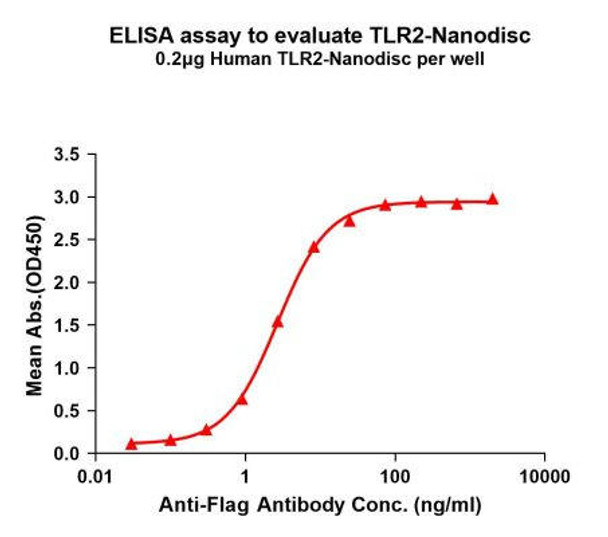Human TLR2 Full-Length Bioactive Membrane Protein (HDFP121)
- SKU:
- HDFP121
- Product Type:
- Recombinant Protein
- Protein Type:
- Full-Length Bioactive Membrane Protein
- Species:
- Human
- Uniprot:
- O60603
Frequently bought together:
Description
system_update_altDatasheet
| Product name | Human TLR2 full length protein-synthetic nanodisc |
| Size: | 10ug |
| Product SKU: | HDFP121 |
| Product Category | Full Length Transmembrane Proteins |
| Target: | TLR2 |
| Uniprot: | O60603 |
| Description: | Human TLR2 full length protein-synthetic nanodisc |
| Molecular Weight: | The human full length TLR2 protein has a MW of 89.8 kDa |
| Protein Family: | Druggable Genome, Transmembrane |
| Protein Pathways: | Toll-like receptor signaling pathway |
| Storage & Shipping: | Store at -20°C to -80°C for 12 months in lyophilized form. After reconstitution, if not intended for use within a month, aliquot and store at -80°C (Avoid repeated freezing and thawing). Lyophilized proteins are shipped at ambient temperature. |
| Synonyms: | CD282; TIL4 |
| Expression System: | HEK293 |
| Formulation: | Lyophilized from nanodisc solubilization buffer (20 mM Tris-HCl, 150 mM NaCl, pH 8.0). Normally 5% - 8% trehalose is added as protectants before lyophilization. Please see Certificate of Analysis for specific instructions. |
| Background: | The protein is a member of the Toll-like receptor (TLR) family which plays a fundamental role in pathogen recognition and activation of innate immunity. TLRs are highly conserved from Drosophila to humans and share structural and functional similarities. This protein is a cell-surface protein that can form heterodimers with other TLR family members to recognize conserved molecules derived from microorganisms known as pathogen-associated molecular patterns (PAMPs). Activation of TLRs by PAMPs leads to an up-regulation of signaling pathways to modulate the host's inflammatory response. This gene is also thought to promote apoptosis in response to bacterial lipoproteins. This gene has been implicated in the pathogenesis of several autoimmune diseases. Alternative splicing results in multiple transcript variants. |
| Delivery: | In Stock |
| Usage | Research use only |












